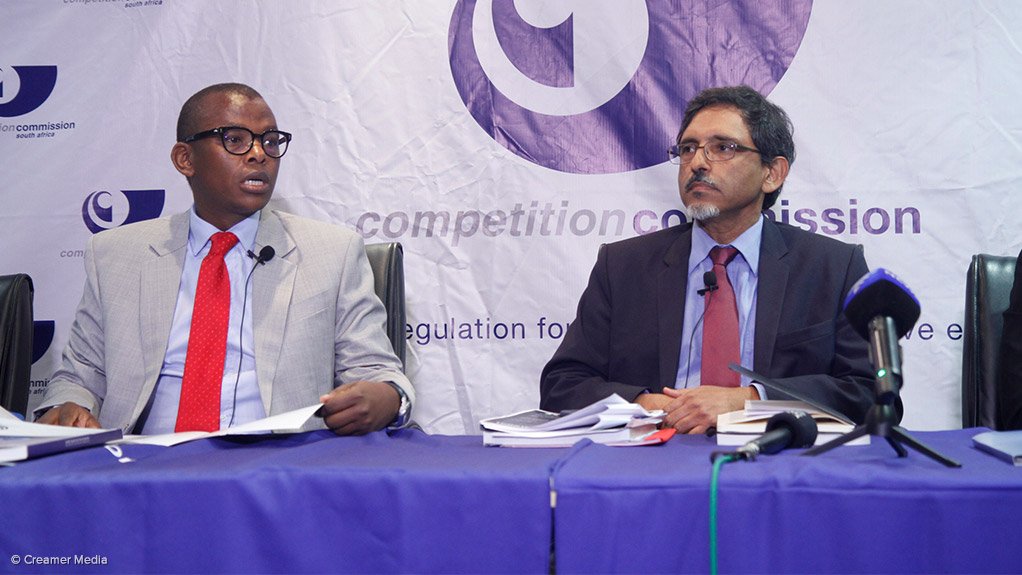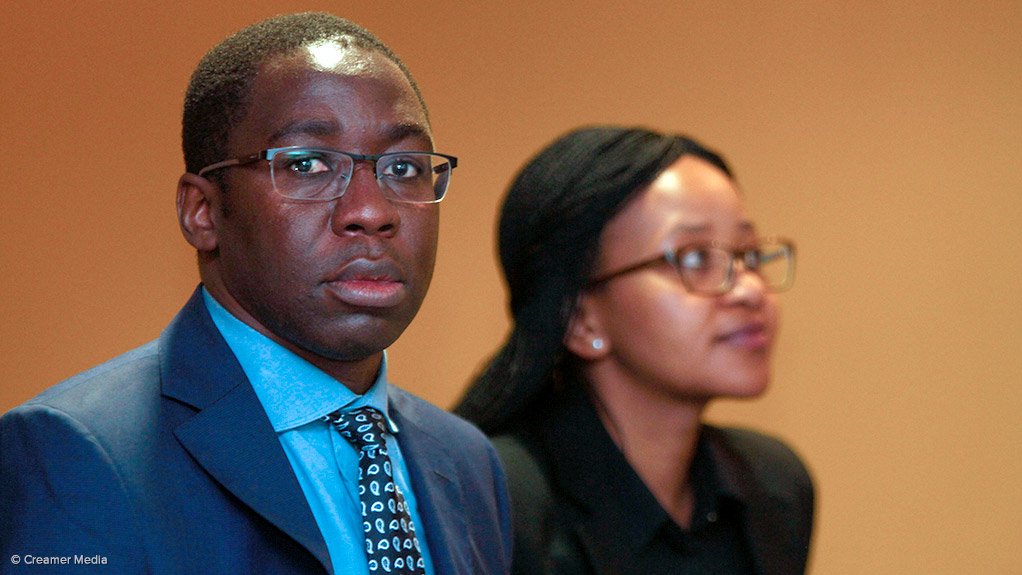LPG industry urged to act on non-binding market inquiry findings



Commissioner Tembinkosi Bonakele and Minister Ebrahim Patel
Photo by Duane Daws
Dr Liberty Mncube and Thembalethu Sithebe
Photo by Duane Daws
South Africa’s Competition Commission has made far-reaching, yet non-binding, recommendations for dealing with prevailing “market distortions” in the domestic liquid petroleum gas (LPG) sector following its first-ever market inquiry, which took nearly three years to complete.
The report identifies serious policy and regulatory misalignments, which are crimping both the production of LPG by existing refineries, as well as investment into new importation infrastructure. It also points to market structures and entrenched behaviours that are raising the costs to industrial and resident consumers and limiting entry into the market by new participants.
Receiving the 206-page report in Pretoria on Monday, Economic Development Minister Ebrahim Patel indicated that the recommendations would be tabled in the National Assembly within the coming two weeks and would be used to drive an inclusive-growth agenda in the LPG industry, as well as the liquid-fuel sector more broadly.
Competition Commission commissioner Tembinkosi Bonakele added that lessons learned from the inquiry would also be applied to the two other market inquiry’s currently under way in the private healthcare and the grocery retail industries.
Patel argued that the report should not be allowed to “gather dust” and urged both the public and private organisations named in the recommendations to take “appropriate action” to improve the performance of the LPG sector rather than focus on the non-binding nature of the remedies.
The report’s recommendations, which were presented by Dr Liberty Mncube and Thembalethu Sithebe, are also accompanied by a “voluntary” implementation plan and associated timeframes.
The commission concludes that the industry is highly concentrated, with 80% of yearly supply of 350 000 t arising from the country’s five refineries – Enref, Chevref, Natref, PetroSA and Sapref – and the balance from imports. Further imports are constrained by inadequate pipeline and storage infrastructure, which is, in turn, undermined by policy, regulatory and pricing dynamics.
The five refineries have long-term supply agreements with four large wholesalers (Afrox, Easigas, Oryx Energies and TotalGaz), which account for more than 90% of the market. In addition, some of these sales agreements are associated with 20-year-plus ‘evergreen’ contracts, which are often accompanied by discounts of up to 10% against the regulated maximum refinery gate price (MRGP).
The price paid by end consumers, known as the maximum retail price (MRP), is also regulated. However, there is evidence of collusion in the setting of deposit fees for gas cylinders, while prevailing cylinder-exchange practices act a barrier to entry for smaller wholesalers. In addition, the fact that wholesalers bundle equipment ownership with gas supply when concluding bulk supply contracts has made switching gas suppliers nearly impossible.
To address the constraints to LPG supply, the commission recommends greater alignment between the National Energy Regulator of South Africa (Nersa) and Transnet National Ports Authority in both the content and timeframes associated with licensing of new import facilities. The current misalignment is viewed as a significant impediment to investment and has also made the process of licensing protected.
It also recommends that Nersa, rather than the Department of Energy (DoE), be responsible for wholesale licensing and that the energy regulator also be responsible for the monitoring and enforcement of the regulated prices.
The commission notes that the DoE, which is currently responsible for monitoring and enforcement on the MRGP and the MRP, lack the inspectorate capacity to fulfil the role. It also notes that the pricing methodology has not been reviewed, despite a DoE commitment, made in 2012, to conduct such a review.
Other key recommendations made in the report include:
• Capping long-term supply agreements to a maximum of ten years.
• Ensuring that smaller wholesalers receive preferential access to 10% of LPG volumes for contracts with a minimum duration of two years.
• Structuring bulk-supply contracts in a way that separates LPG supply from equipment supply, to ensure that end-users own the installed equipment and are, thus, able to switch LPG suppliers.
• Removing restrictions on cylinder exchanges by making it possible for any wholesaler to enter bilateral exchange agreements.
• And having deposit fees for cylinders set by Nersa and linked to the size and cost of each cylinder.
The commission would also continue with its ongoing cartel investigation relating to the current setting of deposit fees by the industry.
It was not immediately clear how the refineries and the established wholesalers would respond to the report, which calls on the industry to implement some of the recommendations as early as October this year.
However, one small wholesaler expressed disappointment with the lack of ambition shown by the commission. In fact, Wasaa Gasses CEO Nokwanele Qonde said the 10% target for smaller wholesalers, together with two-year supply agreements, would be inadequate to facilitate an opening up of the industry to new entrants, particularly if the long-term supply agreements with the majors, together with the discounts, persisted.
However, Bonakele stressed that the recommendations regarding small wholesalers were seen as “minimum” thresholds and were reflective of the highly concentrated nature of the sector. Should the supply constraints outlined in the report be eased, he saw scope for far higher levels of penetration by new entrants.
In fact, the commission notes that a number of licences have already been granted for the development of import facilities and recommends that the regulatory frameworks be reviewed to encourage the construction of LPG import and storage capacity at the country’s ports.
It also recommends that the DoE undertake a market study on how price deregulation could be achieved in the LPG market over time. However, the commission stresses that, in light of prevailing supply bottlenecks, immediate deregulation could result in a price spike.
Article Enquiry
Email Article
Save Article
Feedback
To advertise email advertising@creamermedia.co.za or click here
Press Office
Announcements
What's On
Subscribe to improve your user experience...
Option 1 (equivalent of R125 a month):
Receive a weekly copy of Creamer Media's Engineering News & Mining Weekly magazine
(print copy for those in South Africa and e-magazine for those outside of South Africa)
Receive daily email newsletters
Access to full search results
Access archive of magazine back copies
Access to Projects in Progress
Access to ONE Research Report of your choice in PDF format
Option 2 (equivalent of R375 a month):
All benefits from Option 1
PLUS
Access to Creamer Media's Research Channel Africa for ALL Research Reports, in PDF format, on various industrial and mining sectors
including Electricity; Water; Energy Transition; Hydrogen; Roads, Rail and Ports; Coal; Gold; Platinum; Battery Metals; etc.
Already a subscriber?
Forgotten your password?
Receive weekly copy of Creamer Media's Engineering News & Mining Weekly magazine (print copy for those in South Africa and e-magazine for those outside of South Africa)
➕
Recieve daily email newsletters
➕
Access to full search results
➕
Access archive of magazine back copies
➕
Access to Projects in Progress
➕
Access to ONE Research Report of your choice in PDF format
RESEARCH CHANNEL AFRICA
R4500 (equivalent of R375 a month)
SUBSCRIBEAll benefits from Option 1
➕
Access to Creamer Media's Research Channel Africa for ALL Research Reports on various industrial and mining sectors, in PDF format, including on:
Electricity
➕
Water
➕
Energy Transition
➕
Hydrogen
➕
Roads, Rail and Ports
➕
Coal
➕
Gold
➕
Platinum
➕
Battery Metals
➕
etc.
Receive all benefits from Option 1 or Option 2 delivered to numerous people at your company
➕
Multiple User names and Passwords for simultaneous log-ins
➕
Intranet integration access to all in your organisation


















